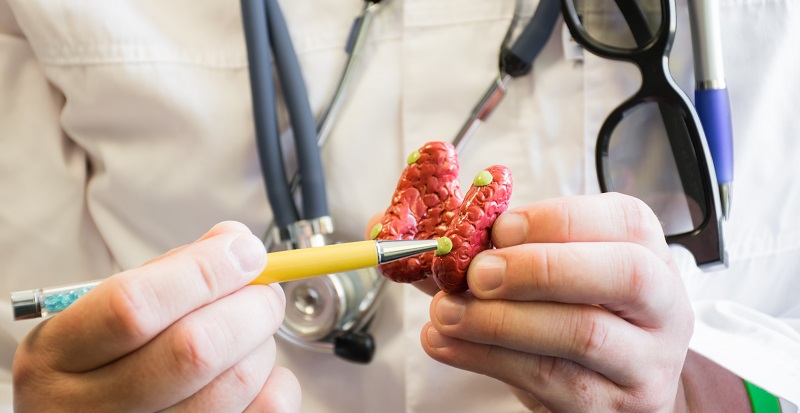
Your parathyroid glands are four tiny glands in your neck that affect your body’s ability to regulate the amount of nutrients in your system. If these glands get damaged or begin to work improperly, it can affect your nutrient levels and lead to problems in your body. Two common nutrients that the parathyroid glands regulate are calcium and Vitamin D, and two common problems associated with lack of these nutrients are the development of kidney stones and osteoporosis.
So how can we make sure our parathyroid glands are helping us get adequate levels of these nutrients, and how can we treat parathyroid issues that develop? We answer those questions and more in today’s blog.
Causes and Symptoms of Parathyroid Problems
Although they sound the same, your parathyroid glands are completely different from your thyroid gland, and your parathyroid glands have their own distinct job. Parathyroid hormone (PTH) helps to keep calcium in your bloodstream, but if a nodule or growth on one or more of the glands causes over or underproduction of PTH, problems can occur. The more common issue caused by parathyroid disease is hyperparathyroidism.
Hyperparathyroidism is caused by unsafe levels of calcium in the bloodstream, Vitamin D deficiency and chronic kidney disease. Symptoms of the condition aren’t always easy to spot, because many people don’t have any symptoms. The majority of the time, problems associated with the parathyroid glands are uncovered during routine blood testing, instead of due to symptom prevalence. However, just because you don’t have symptoms doesn’t mean that it can be ignored. Left untreated, hyperparathyroid disease can lead to kidney stones, kidney blockage, and expedited symptoms of osteoporosis, which can increase your fracture risk.
Treatment and Parathyroid Surgery
If problems with the parathyroid glands go unaddressed for too long, the only treatment option may be surgery. Before we get into the specifics of surgery, let’s take a look at prevention techniques, as prevention is always preferred to treatment.
For starters, the best way to prevent problems with your parathyroid glands are by making sure your body has enough calcium and Vitamin D. If our body doesn’t get enough of these nutrients, the parathyroid glands can go into overdrive trying to produce the nutrients, and that can lead to overproduction or the inability to maintain proper levels. Vitamin D also helps with the absorption of calcium, so lack of Vitamin D can also lead to calcium problems.
We get a lot of calcium and Vitamin D from a healthy diet, so be conscious of the foods you are putting in your body. We can also get Vitamin D from sun exposure, but because we live in the north, we don’t get enough direct sunlight in the winter months for our body to be able to produce healthy levels of the vitamin. Because of this, both calcium and Vitamin D supplements are a good idea. Most adults need between 1,200 and 1,500 mg of calcium a day, and about 1,000 international units of Vitamin D a day. By regularly getting enough of these nutrients, you can greatly reduce your risk of parathyroid problems.
In the event that your parathyroid problems are caught too late for supplements to rectify the problem, surgery many be your only answer. During parathyroid surgery, your surgeon will remove part of a parathyroid gland or multiple glands in order to leave only the healthy glands in tact. Taking the damaged glands out often cures the problem and allows the remaining glands to produce the right amount of nutrients, although supplements may still be recommended. Parathyroid gland surgery is typically very effective and risks are minimal when performed by an experienced surgeon like Dr. Koeplin.